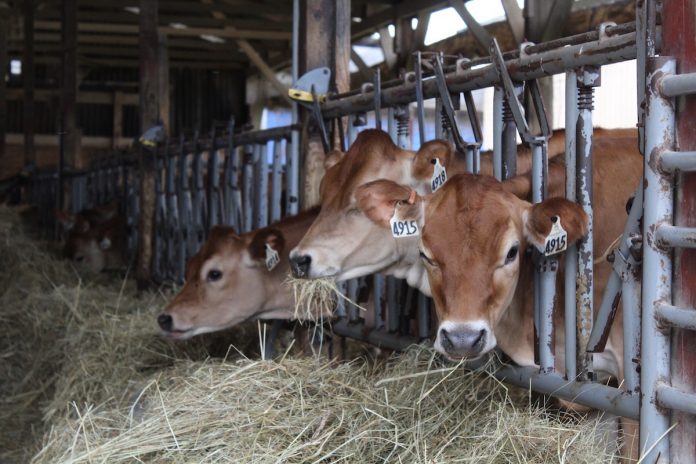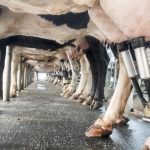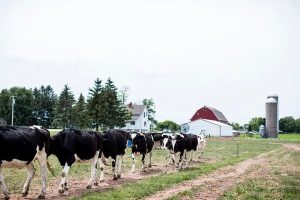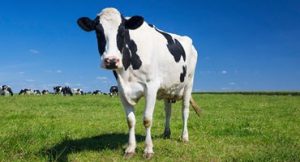
More milk with the A2 label is making its way to the stores, along with claims that it’s easier to digest and causes less intestinal discomfort than regular milk.
It’s a niche market for now, but some see it as the future of fluid milk.
It’s all about genetics
People who are lactose intolerant are unable to digest lactose, a sugar found in milk. But A2 milk is all about a protein.
Milk has different types of proteins, one of which is called casein, said Maurice Eastridge, a professor and extension dairy specialist at Ohio State University.
Depending on the cow’s genetics, it could produce the A1 beta casein, A2 beta casein or both in its milk.
Certain breeds, like Guernsey and Jersey, naturally are more likely to have the A2/A2 gene that produces only the A2 beta casein in milk.
Regular A1 milk has a mix of both the A1 and A2 proteins. Milk marketed as A2 only has the A2 protein.
Eastridge said the dairy community has known about the different types of proteins for years. A few decades ago, researchers began looking into how the A2 protein might impact dairy products.
The A2 difference
The a2 Milk Company, founded in New Zealand in 2000, began selling milk containing only the A2 protein in the U.S. in 2015 in California. This year, it reached national distribution.
Farmers and consumers often point to the book Devil in the Milk by Keith Woodford, published in 2007, as what turned them on to the A2 milk difference.
The book makes claims that regular A1 milk is connected with a number of serious illnesses, including heart disease, Type 1 diabetes, autism and schizophrenia.
What scientific literature points to is less extreme.
Eastridge said some studies show that milk consumed that has a higher A2 protein content creates less inflammation in the intestine, and presumably less intestinal discomfort.
Other studies show there isn’t a difference in consuming regular milk with the A1 protein or A2 milk in terms of intestinal discomfort or digestibility.
“The data is mixed,” he said. ‘But it does have the attention of consumers. And it does have the attention of the dairy industry.”
A new study at Purdue University, funded jointly by National All-Jersey and the a2 Milk Company, is looking into the digestibility of different milks in people who are lactose intolerant.
The study, headed by nutrition policy professor Dennis Savaiano, will compare four milks — A2 milk, conventional A1 milk, Jersey milk and lactose-free milk, said Erick Metzger, general manager for National All-Jersey.
The study is supposed to conclude sometime this fall.
It takes time
Regardless of the surety of the science behind it, dairies are making the switch to breeding for the A2/A2 gene and selling milk marketed as containing only the A2 protein.
Heather Fuston, marketing director for Snowville Creamery, said they switched to A2 milk after one of the founders of the company read Devil in the Milk and began researching the possible benefits of A2.
Snowville Creamery is based in Pomeroy, Ohio, in Meigs County, and receives milk from three farms that. In addition to A2, they also market their milk as coming from cows that are allowed to graze and use non-GMO feeds.
Switching to A2 isn’t something that can happen overnight.
“We had to give our farmers multiple years’ notice that this was something we wanted to work towards,” Fuston said. “It required them to breed the genetics into their existing herd or replace their cows with cows with A2.”
Snowville began selling A2 milk in 2015, she said. A half gallon retails between $4.99 and $5.49. Their milk is also non-homogenized and minimally processed, which may also make a difference with digestibility, Fuston said.
“All the time people tell us ‘I thought I was lactose intolerant, and yours is the only milk I can drink now,’” she said.
Niche market, for now
Vickie Baker, owner of Maple Bottom Farm, said she began breeding her cows to only A2 bulls about eight years ago.
The farm, in Westmoreland County, Pennsylvania, milks all major dairy breeds, but is focusing now on its Guernseys. She read Devil in the Milk and heard Guernsey breeders talking about the A2 protein years ago.
“When I started asking which bulls were A2 from [artificial insemination] companies, the guys looked at me like they didn’t know what I was talking about,” she said. But that’s changed now that others are showing an interest in the A2 gene.
Baker sees A2 milk as the only way to grow the fluid milk market. There’s no downside to breeding for the A2 gene, and the upside is that possibly more people can comfortably drink the milk.
Baker is in the process of forming a Guernsey co-op with six dairies to sell “golden Guernsey” milk. The milk will also likely have a higher A2 content that regular milk, but they’re not marketing it as A2, Baker said.
“We know golden Guernsey has a place in the niche market,” she said. “It won’t be in every refrigerator. But we know people are looking for milk they can drink and looking for smaller scale.”
A tangible difference
Indian Creek Creamery, in De Graff, Ohio, began bottling their own non-homogenized milk in February and sells both A2 and regular A1 milk, said Ella King, who helps run the farm owned by her parents, Ray and Colleen Jackson.
The Jacksons, in Logan County, began breeding for the A2 gene about five years ago. King said she did a research paper on A2 milk in college and talked to her parents about pursuing it.
Just over 20 of their 80 milking cows now have the A2 gene. They too put a focus on non-GMO feed, grazing and minimal processing for their milk.
“We were seeing that it might start to become a bigger thing,” she said.
Their A2 milk sells for about 75 cents more per half gallon than their regular A1 milk. The retail price for their A2 milk is around $4, she said.
They’ve heard good things from people who drink it, but the demand for A2 shows in the sales.
“In some areas, it’s crazy how well the A2 sells,” King said.
They’ve found it sells especially well around bigger cities.
“It’s a real tangible thing,” she said. “There’s all kinds of marketing things, like organic or non-GMO. But at least with A2, you can genetically test for it. That’s intriguing.”

























